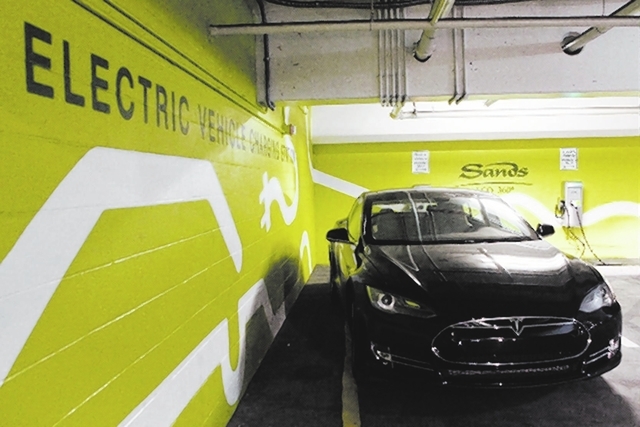New report touts benefits of electric automobiles

It remains questionable whether electric cars will save the planet.
But they can save the air quality in some of the Southwest’s biggest cities, including Las Vegas, according to a new report.
“There’s a real opportunity in Nevada to take advantage of the clean electricity there,” said Will Toor, co-author of a report saying Nevada stands to benefit as electric cars become more common.
Toor and co-author Mike Salisbury are with the Southwest Energy Efficiency Project, a Colorado-based nonprofit research group known by its initials, SWEEP.
The report focuses on the source of electricity in each of six Western states: Arizona, Nevada, Colorado, New Mexico, Utah and Wyoming.
It concludes that Arizona, Nevada and Colorado are well-suited to electric car use, while the other states may not be.
“There’s an enormous difference state to state,” Toor said.
Most of the electricity used in Nevada is generated by relatively clean natural gas-fired power plants, while the main source of power in Wyoming is coal.
“Electric vehicles are the most efficient vehicle type in Nevada,” according to the report.
It says an electric vehicle can travel 100 miles in Nevada using the same amount of energy required for a gasoline-powered vehicle to travel 76 miles.
Travis Johnson, NV Energy’s electric transportation program manager and an electric car devotee, said Nevada’s growth led to the building of new plants in recent years.
The new plants are more efficient and cleaner than older plants.
According to the report, more than 80 percent of the electricity in Nevada comes from natural gas or renewable energy, while the rest comes from coal-fired plants. It is nearly the opposite in Wyoming, with 88 percent coming from coal.
Nevada’s power sources are due to get cleaner, too, with the coal-fired Reid Gardner generating station near Moapa set to begin being taken offline next year.
Overall, there is much debate about whether electric vehicles offer a solution to the fossil fuel problem that experts believe is contributing to global warming.
The federal government offers tax incentives of up to $7,500 for people who buy electric cars. The purpose is to get more electric cars on the road, which, in theory, would lead to less pollution.
But it’s not that simple. Because of the coal issue, and because of a quirk in federal gas-mileage requirements for automobile manufacturers, there may be no environmental benefit at all from the tax break.
A 2012 report from the nonpartisan Congressional Budget Office concludes as much, noting that manufacturers who sell more electric and hybrid vehicles are, as a consequence, then allowed to sell more gas-guzzling vehicles. These are known as the CAFE standards, short for Corporate Average Fuel Economy. In the end, it equals out.
“Consequently, the credits will result in little or no reduction in the total gasoline use and greenhouse gas emissions of the nation’s vehicle fleet over the next several years,” the CBO report concludes.
The incentives could, if the rules were tweaked to discourage manufactures from producing gas-guzzlers, have a positive benefit in the long term, however, the CBO report states.
There are other potential problems with electric vehicles, as noted in a recent piece in the IEEE Spectrum trade magazine, a publication from the Institute of Electrical and Electronics Engineers.
The piece, authored by Ozzie Zehner, a visiting scholar at the University of California-Berkeley, detailed issues associated with the manufacturing and disposal of electric vehicles, including the highly toxic batteries they use.
In addition, the vehicles must get their power from somewhere. Today, most of the power generated in the United States comes from coal-fired plants. Coal-fired power plants are the top source of carbon dioxide emissions in the United States.
So, in the end, electric vehicles can still be polluting the environment, even though they emit no pollutants themselves.
“The potential benefits of electric vehicles compared to gasoline and CNG vehicles are highly dependent on the sources of electricity that fuel the vehicles,” the new SWEEP report concludes.
The issue is not just a global one, the authors note. Air pollution in urban areas is largely caused by the internal combustion engine. Replacing traditional cars with electric cars would shift the pollution source from the urban vehicle to the power plant, typically outside of town.
If the power plant is a clean one, there is double the potential benefit to the urban area. It will not only clean the local air, it can have a positive effect on the overall environment.
“They do really help address the urban air quality issue,” said Salisbury, one of the authors.
Johnson, from NV Energy, noted other benefits. There is a huge potential economic benefit. The power company allows electric car owners to sign up for special rates, which are about half the normal power rates.
Under the lower rates, charging a typical electric car every night can cost anywhere from $15 to $25 a month, depending on use.
That’s less than the cost of a single tank of gasoline.
Electric cars are typically much more expensive than gasoline-powered cars, though. But Johnson said that with the federal tax and fuel savings, it still makes financial sense to buy an electric car. They don’t get less efficient over time, he said, like gasoline-powered vehicles do.
Lastly, Johnson noted that when fueling up an electric car through an outlet in the garage, a user is paying a fee to NV Energy, which means the money remains in Nevada, unlike purchasing gasoline.
The report’s authors noted that, too.
They recommended that Nevada adopt policies that encourage more electric vehicles, including possible financial incentives. Other states already offer those.
The only benefit offered by Nevada’s lawmakers so far to owners of electric vehicles is free parking in public parking lots.
Contact reporter Richard Lake at rlake@reviewjournal.com or 702-383-0307.